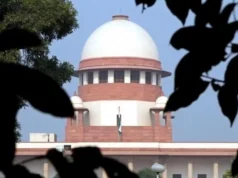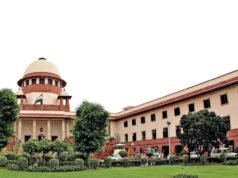New Delhi – In a landmark decision on may, 20 aimed at improving the quality of entry-level judges, the Supreme Court of India has ruled that candidates seeking appointment as Civil Judges (Junior Division) must have a minimum of three years’ experience as practicing advocates before being eligible to sit for judicial service examinations.
The ruling was delivered by a Bench comprising Chief Justice of India (CJI) BR Gavai and Justices AG Masih and K Vinod Chandran in the case All India Judges Association and Others v. Union of India.
Key Directions of the Judgment:
Mandatory Legal Experience: All High Courts and State Governments must amend their respective Judicial Service Rules to include a minimum three-year practice requirement for candidates applying for the post of Civil Judge (Junior Division).
Implementation Timeline:
- High Courts must amend their rules within three months.
- State governments must approve the amendments within the following three months.
Prospective Application Only:
This new eligibility requirement will not apply to ongoing recruitment processes that were initiated before the date of this judgment. It will be applicable only from the next selection cycle onward.
Rationale Behind the Decision:
The Court expressed concern over the appointment of fresh law graduates as judicial officers, highlighting their lack of courtroom experience and practical exposure.
“From day one, a judge is expected to handle matters involving life, liberty, property, and reputation. Book knowledge and pre-service training cannot substitute first-hand experience in courtrooms,” the judgment reads.
The Court also referred to concerns raised by High Courts about behavioral and temperament issues displayed by newly appointed judges without prior Bar experience.
Clarifications on Legal Practice Criteria:
- When to Count Experience: The Court held that the three-year practice period shall be calculated from the date of provisional enrolment, not from the date of clearing the All India Bar Examination (AIBE).
Certification of Experience:
- If the candidate practiced in trial courts, the certificate must be issued by a Principal Judicial Officer or an Advocate with 10 years’ standing, endorsed by the said officer.
- For practice before High Courts or the Supreme Court, certification must be given by a senior advocate, endorsed by a designated officer of the respective Court.
Law Clerks Included:
The Court also clarified that experience as a Law Clerk to a Judge may be considered towards satisfying the legal practice requirement.
Mandatory Judicial Training Introduced:
In another significant directive, the Court mandated that all candidates appointed through judicial service examinations must undergo at least one year of training before presiding over a courtroom.
“The Rules shall also mandate that the candidates … must compulsorily undergo at least one year of training before presiding in a court,” the Court held.
Background and Legal Context:
The decision stems from a challenge to the Madhya Pradesh High Court’s 2002 amendment mandating three years of legal practice for civil judges. While some States followed this precedent, others continued to allow direct entry for law graduates.
The constitutional debate revolved around Article 233(2) of the Constitution, which requires seven years of practice for appointment as a District Judge, but does not explicitly apply to Civil Judges (Junior Division). This created a legal vacuum leading to inconsistent judicial service rules across States.
While Bar Councils and several State authorities supported the practice requirement to ensure judicial competence, law graduates and academic institutions opposed it, calling it arbitrary and exclusionary.
Conclusion:
This judgment aims to bring uniformity and enhance the quality of the lower judiciary by ensuring that judicial officers have foundational courtroom exposure. The ruling is expected to significantly reshape judicial recruitment across the country, setting a new standard for merit and experience in the Indian judiciary.










